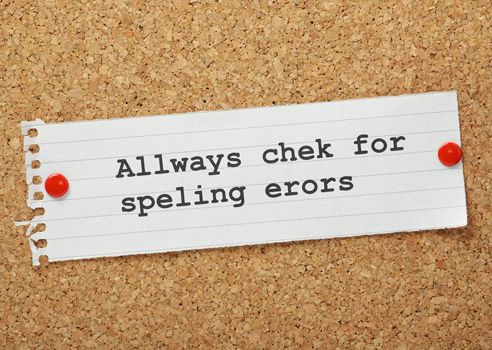Reading time: About 3 minutes
Some writers worry about or are embarrassed by their spelling. Today I tell you why this is an unnecessary concern and when you should ignore spelling…
I try to read about 80 blogs a week. Most of them are related to writing, productivity or creativity and these missives inspire me, inform me and, occasionally, enrage me. One that fell into that last category was headlined, “15 Essential Tips For Becoming a Better Writer.” Unable to ignore a come-on as compelling as that, I clicked immediately.
What a disappointment! If I’d hoped for any new ideas, I was misguided. The tips consisted of such painfully obvious suggestions as “read a lot,” “research a lot,” and, “make writing simple.” Really? Does the writer really think any of those tips will help?
But there was also a tip that infuriated me. Here is how the author phrased it:
Perfect Grammar and Spelling
Grammar and spelling is very important when you write something. The writer should be fluent and expert in grammar and spelling. So, make sure to brush up on the fundamental theories and standards of writing, grammar and spelling.
There are so many points wrong with this suggestion that I scarcely know where to begin. But let me try:
1-The “fundamental theories and standards” of grammar and spelling are a life’s work. They are scarcely something you can just “brush up” on. The blogger makes this fluency sound no more daunting than reviewing a short list of irregular verbs. But, in fact, people who are good at grammar and spelling have worked hard at it, probably have some natural ability with it and were usually blessed with parents who were able to reinforce these skills when their children were young. This usually excludes anyone who was born of parents who spoke English as a second language or anyone born in poverty where parents understood that putting meals on the table and paying rent was more important than grammar or spelling.
2-Too much focus on the mechanics of spelling (and grammar) puts the focus on the least important part of the exercise: the package in which the ideas are wrapped. In fact, writing should be judged on whether it expresses interesting, provocative or creative ideas. I would rather read a stimulating post with appalling spelling than a boring post spelled to perfection. No contest. Writing is about communicating. If you don’t have something useful to say then the perfection of the delivery is irrelevant.
3-Many great writers over the years have been abysmal spellers. Here is a partial list: William Faulkner. F. Scott Fitzgerald. Ernest Hemingway. John Keats. John Irving. Jane Austen. Winston Churchill. Agatha Christie. W.B. Yeats. Benjamin Franklin. This does not make them bad writers. It simply makes them bad spellers. You can read more about these writers’ spelling problems here.
4-Copy editors (paid or volunteer) can fix spelling and grammar. Note that I’m not suggesting published work should be filled with errors. Far from it. But copy editors are professionals who fix these mistakes. And if you can’t afford one, there are many “natural” copy editors in our midst (I find many smart admin assistants are often excellent copy editors). Moms and dads will also usually work at no charge. As well, you can use the no-cost version of services such as Spellcheck or ProWriting Aid.
5-The author of the blog post made an error in his own point about the importance of grammar and spelling. He wrote, “Grammar and spelling is very important,” when he should have written, “Grammar and spelling ARE very important.” I don’t want to make fun of him, which would be unkind, but it’s hard to overlook the irony of a mistake in this very short paragraph.
I am passionate about the unimportance of spelling to writers, in part, because my adult son is dyslexic even though he is incredibly articulate and smart. Experts tell us that some five to 10 percent of our population is dyslexic. So, when reader Russ Skinner sent me a link to a post from the blog Cult of Pedagogy, I read it and smiled. Headlined “Why is my kid allowed to make spelling mistakes?” the post addresses why teachers will sometimes “ignore” spelling. I liked this post, in part, because it made so many effective arguments about why writers should delay editing their own work. Here is what the blog’s author Jennifer Gonzalez had to say:
“Too much focus on correctness interrupts the flow of ideas. Furthermore, teachers want students to understand that good writers revise their pieces many times for structure, development, clarity and voice. Although the mechanics are important for polish, correct spelling can’t make up for a poorly structured, underdeveloped piece of writing. And if a piece is going to be revised several times, it makes no sense to keep correcting the mechanics, only to have those words dumped entirely in a later revision.”
I also like the metaphor she used to wrap up her argument:
“Producing a finished piece of writing is a lot like putting on a polished musical performance: It requires the synthesis of many skills, some of which need to be handled separately. Imagine if a band conductor brought a brand-new piece of music to her band and expected all sections to play it together, perfectly, the first time. Even someone with no musical training can see that this is an unreasonable approach. Instead, if each instrument section starts by practicing their part separately, the performers will get really solid on their individual parts before pulling it all together to refine the complete performance.”
My conclusion? Don’t worry about your spelling until you sort out your ideas, first. And if you have a disability that makes spelling impossible for you, then assign the job to someone else.
*
My video podcast last week discussed how to write memoir. Go here to see the video or read the transcript, and you can also subscribe to my YouTube channel.
*
Have you ever been paralyzed by fear of writing? Don’t let this nasty psychological barrier make your life miserable or cost you missed income. I’ve developed a series of 18 videos (with audio and text versions) for just $95 that will help you banish the fear. Plus, you’ll get membership to an online group of others facing the same challenge. Have a look at the program here.
*
Need some help developing a better writing routine? Learn more about my Get It Done program. There is turn-over each month, and priority will go to those who have applied first. You can go directly to the application form and you’ll hear back from me within 24 hours.
*
Are you a natural speller or do you struggle with the task? We can all learn from each other so, please, share your thoughts with my readers and me in the “comments” section below. Anyone who comments on today’s post (or any others) by July 31/22 will be put in a draw for a digital copy of my first book, 8 1/2 Steps to Writing Faster, Better. To enter, please scroll down to the comments, directly underneath the “related posts” links, below. Note that you don’t have to join Disqus to post. See here to learn how to post as a guest.
An earlier version of this post first appeared on my blog on June 13/17.


